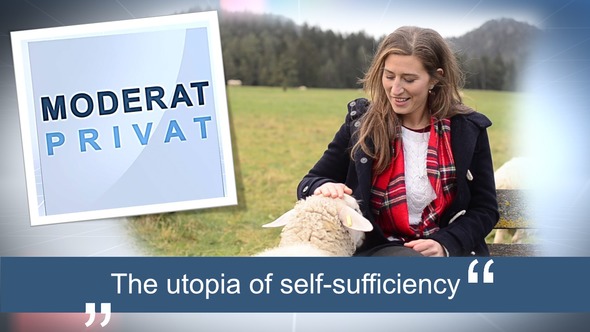All videos (English)
The utopia of self-sufficiency
20.01.2023
Subtitle "Afrikaans" was produced by machine.Subtitle "አማርኛ" was produced by machine.Subtitle "العربية " was produced by machine.Subtitle "Ārāmāyâ" was produced by machine.Subtitle "azərbaycan dili " was produced by machine.Subtitle "беларуская мова " was produced by machine.Подзаглавието "България" е създадено от машина.সাবটাইটেল "বাংলা " মেশিন দ্বারা তৈরি করা হয়েছিল।Subtitle "བོད་ཡིག" was produced by machine.Subtitle "босански" was produced by machine.Subtitle "català" was produced by machine.Subtitle "Cebuano" was produced by machine.Subtitle "ગુજરાતી" was produced by machine.Subtitle "corsu" was produced by machine.Podtitul "Čeština" byl vytvořen automaticky.Subtitle "Cymraeg" was produced by machine.Subtitle "Dansk" was produced by machine.Untertitel "Deutsch" wurde maschinell erzeugt.Subtitle "Untertitel" was produced by machine.Ο υπότιτλος "Ελληνικά" δημιουργήθηκε αυτόματα.Subtitle "English" was produced by machine.Subtitle "Esperanto" was produced by machine.El subtítulo "Español" se generó automáticamente.Subtitle "Eesti" was produced by machine.Subtitle "euskara" was produced by machine.Subtitle "فارسی" was produced by machine.Subtitle "Suomi" was produced by machine.Le sous-titrage "Français" a été généré automatiquement.Subtitle "Frysk" was produced by machine.Subtitle "Gaeilge" was produced by machine.Subtitle "Gàidhlig" was produced by machine.Subtitle "Galego" was produced by machine.Subtitle "Schwizerdütsch" was produced by machine.Subtitle "هَوُسَ" was produced by machine.Subtitle "Ōlelo Hawaiʻi" was produced by machine.Subtitle "עברית" was produced by machine.Subtitle "हिन्दी" was produced by machine.Subtitle "Mẹo" was produced by machine.Subtitle "Hrvatski" was produced by machine.Subtitle "Kreyòl ayisyen " was produced by machine.Subtitle "Magyar" was produced by machine.Subtitle "Հայերեն" was produced by machine.Subtitle "Bahasa Indonesia " was produced by machine.Subtitle "Asụsụ Igbo " was produced by machine.Textun"Íslenska" var framkvæmt vélrænt.Sottotitoli "Italiano" sono stati generati automaticamente.字幕は"日本語" 自動的に生成されました。Subtitle "Basa Jawa" was produced by machine.Subtitle "ქართული" was produced by machine.Subtitle "қазақ тілі " was produced by machine.Subtitle "ភាសាខ្មែរ" was produced by machine.Subtitle "ಕನ್ನಡ" was produced by machine.Subtitle "한국어" was produced by machine.Subtitle "कोंकणी語" was produced by machine.Subtitle "کوردی" was produced by machine.Subtitle "Кыргызча" was produced by machine.Subtitle " lingua latina" was produced by machine.Subtitle "Lëtzebuergesch" was produced by machine.Subtitle "Lingala" was produced by machine.Subtitle "ພາສາ" was produced by machine.Subtitle "Lietuvių" was produced by machine.Subtitle "Latviešu" was produced by machine.Subtitle "fiteny malagasy" was produced by machine.Subtitle "te reo Māori" was produced by machine.Subtitle "македонски јазик" was produced by machine.Subtitle "malayāḷaṁ" was produced by machine.Subtitle "Монгол хэл" was produced by machine.Subtitle "मराठी" was produced by machine.Subtitle "Bahasa Malaysia" was produced by machine.Subtitle "Malti" was produced by machine.Subtitle "မြန်မာစာ " was produced by machine.Subtitle "नेपाली" was produced by machine.Ondertitels "Nederlands" machinaal geproduceerd.Subtitle "Norsk" was produced by machine.Subtitle "chiCheŵa" was produced by machine.Subtitle "ਪੰਜਾਬੀ" was produced by machine.Podtytuł "Polska" został utworzony przez maszynę.Subtitle "پښتو" was produced by machine.Legenda "Português" foi gerada automaticamente.Subtitle "Română" was produced by machine.Subtitle "Язык жестов (Русский)" was produced by machine.Субтитры "Pусский" были созданы машиной.Subtitle "Kinyarwanda" was produced by machine.Subtitle "सिन्धी" was produced by machine.Subtitle "Deutschschweizer Gebärdensprache" was produced by machine.Subtitle "සිංහල" was produced by machine.Subtitle "Slovensky" was produced by machine.Subtitle "Slovenski" was produced by machine.Subtitle "gagana fa'a Samoa" was produced by machine.Subtitle "chiShona" was produced by machine.Subtitle "Soomaaliga" was produced by machine.Subtitle "Shqip" was produced by machine.Subtitle "србски" was produced by machine.Subtitle "Sesotho" was produced by machine.Subtitle "Basa Sunda" was produced by machine.Undertext "Svenska" är maskinell skapad.Subtitle "Kiswahili" was produced by machine.Subtitle "தமிழ்" was produced by machine.Subtitle "తెలుగు" was produced by machine.Subtitle "Тоҷикй" was produced by machine.Subtitle "ภาษาไทย" was produced by machine.ንኡስ ኣርእስቲ "ትግርኛ" ብማሽን እዩ ተፈሪዩ።Subtitle "Türkmençe" was produced by machine.Subtitle "Tagalog" ay nabuo sa pamamagitan ng makina.Subtitle "Türkçe" was produced by machine.Subtitle "татар теле" was produced by machine.Subtitle "Українська " was produced by machine.ذیلی عنوان "اردو" مشین کے ذریعہ تیار کیا گیا تھا۔Subtitle "Oʻzbek" was produced by machine.Phụ đề được tạo bởi máy.Subtitle "Serbšćina" was produced by machine.Subtitle "isiXhosa" was produced by machine.Subtitle "ייִדיש" was produced by machine.Subtitle "Yorùbá" was produced by machine.Subtitle "中文" was produced by machine.Subtitle "isiZulu" was produced by machine.
kla.TV accepts no liability for defective translation.kla.TV accepts no liability for defective translation.kla.TV accepts no liability for defective translation.kla.TV accepts no liability for defective translation.kla.TV accepts no liability for defective translation.kla.TV accepts no liability for defective translation.kla.TV не носи отговорност за некачествен превод.অপর্যাপ্ত অনুবাদের জন্য kla.TV কোন দায় বহন করে না।kla.TV accepts no liability for defective translation.kla.TV accepts no liability for defective translation.kla.TV accepts no liability for defective translation.kla.TV accepts no liability for defective translation.kla.TV accepts no liability for defective translation.kla.TV accepts no liability for defective translation.kla.TV nenese žádnou odpovědnost za chybné překlady.kla.TV accepts no liability for defective translation.kla.TV accepts no liability for defective translation.kla.TV übernimmt keine Haftung für mangelhafte Übersetzung.kla.TV accepts no liability for inadequate translationΗ kla.TV δεν φέρει καμία ευθύνη για ανεπαρκή μετάφραση.kla.TV accepts no liability for defective translation.kla.TV accepts no liability for defective translation.kla.TV no se hace responsable de traducciones incorrectas.kla.TV accepts no liability for defective translation.kla.TV accepts no liability for defective translation.kla.TV accepts no liability for defective translation.kla.TV accepts no liability for defective translation.kla.TV n'assume aucune responsabilité en cas de mauvaise traduction.kla.TV accepts no liability for defective translation.kla.TV accepts no liability for defective translation.kla.TV accepts no liability for defective translation.kla.TV accepts no liability for defective translation.kla.TV accepts no liability for defective translation.kla.TV accepts no liability for defective translation.kla.TV accepts no liability for defective translation.kla.TV accepts no liability for defective translation.kla.TV accepts no liability for defective translation.kla.TV accepts no liability for defective translation.kla.TV accepts no liability for defective translation.kla.TV accepts no liability for defective translation.kla.TV nem vállal felelősséget a hibás fordításértkla.TV accepts no liability for defective translation.kla.TV accepts no liability for defective translation.kla.TV accepts no liability for defective translation.kla.TV tekur enga ábyrgð á áræðanleika þýðingarinnarKla.TV non si assume alcuna responsabilità per traduzioni lacunose e/o errate.Kla.TV は、不適切な翻訳に対して一切の責任を負いません。kla.TV accepts no liability for defective translation.kla.TV accepts no liability for defective translation.kla.TV accepts no liability for defective translation.kla.TV accepts no liability for defective translation.kla.TV accepts no liability for defective translation.kla.TV accepts no liability for defective translation.kla.TV accepts no liability for defective translation.kla.TV accepts no liability for defective translation.kla.TV accepts no liability for defective translation.kla.TV accepts no liability for defective translation.kla.TV accepts no liability for defective translation.kla.TV accepts no liability for defective translation.kla.TV accepts no liability for defective translation.kla.TV accepts no liability for defective translation.kla.TV accepts no liability for defective translation.kla.TV accepts no liability for defective translation.kla.TV accepts no liability for defective translation.kla.TV accepts no liability for defective translation.kla.TV accepts no liability for defective translation.kla.TV accepts no liability for defective translation.kla.TV accepts no liability for defective translation.kla.TV accepts no liability for defective translation.kla.TV accepts no liability for defective translation.kla.TV accepts no liability for defective translation.kla.TV accepts no liability for defective translation.kla.TV aanvaardt geen aansprakelijkheid voor foutieve vertalingen.kla.TV accepts no liability for defective translation.kla.TV accepts no liability for defective translation.kla.TV accepts no liability for defective translation.kla.TV nie ponosi odpowiedzialności za wadliwe tłumaczenie.kla.TV accepts no liability for defective translation.kla.TV não se responsabiliza por traduções defeituosas.kla.TV accepts no liability for defective translation.kla.TV accepts no liability for defective translation.kla.TV не несет ответственности за некачественный перевод.kla.TV accepts no liability for defective translation.kla.TV accepts no liability for defective translation.kla.TV accepts no liability for defective translation.kla.TV accepts no liability for defective translation.kla.TV accepts no liability for defective translation.kla.TV accepts no liability for defective translation.kla.TV accepts no liability for defective translation.kla.TV accepts no liability for defective translation.kla.TV accepts no liability for defective translation.kla.TV nuk mban asnjë përgjegjësi për përkthime joadekuate.kla.TV accepts no liability for defective translation.kla.TV accepts no liability for defective translation.kla.TV accepts no liability for defective translation.Kla.TV tar inget ansvar för felaktiga översättningar.kla.TV accepts no liability for defective translation.kla.TV accepts no liability for defective translation.kla.TV accepts no liability for defective translation.kla.TV accepts no liability for defective translation.kla.TV accepts no liability for defective translation.kla.TV ንዝኾነ ጉድለት ትርጉም ዝኾነ ይኹን ሓላፍነት ኣይቅበልን እዩ።kla.TV accepts no liability for defective translation.kla. Walang pananagutan ang TV sa mga depektibong pagsasalin.kla.TV accepts no liability for defective translation.kla.TV accepts no liability for defective translation.kla.TV accepts no liability for defective translation.kla.TV عیب دار ترجمہ کے لیے کوئی ذمہ داری قبول نہیں کرتا ہے۔kla.TV accepts no liability for defective translation.Kla. TV không chịu trách nhiệm về bản dịch không đầy đủ.kla.TV accepts no liability for defective translation.kla.TV accepts no liability for defective translation.kla.TV accepts no liability for defective translation.kla.TV accepts no liability for defective translation.kla.TV accepts no liability for defective translation.kla.TV accepts no liability for defective translation.
This is a modal window.
The media could not be loaded, either because the server or network failed or because the format is not supported.
The utopia of self-sufficiency
20.01.2023
www.kla.tv/24814
Inspired by Ivo Sasek’s speech on the self-sufficiency and self-sufficiency efforts that very often rival the enlightenment struggle that has not yet fully broken through, Judith – a farmer herself – explored the question of whether one can be self-sufficient at all and what really takes priority. See her conclusion here.
[continue reading]
The utopia of self-sufficiency
Download broadcast and attachments in the wanted quality:
Useage rights:
Standard-Kla.TV-Licence
Trending on Kla.TV






20.01.2023 | www.kla.tv/24814
Inspired by Ivo Sasek's speech about the self-sufficiency aspirations that very often rival the struggle for enlightenment that has not yet fully broken through, Judith – herself a farmer – explored the question of whether one can be truly self-sufficient and what really takes priority. See her conclusion here. Hello everyone, I'm Judith. Many people whom I got to know through Kla.TV are currently dealing intensively with autarky, self-sufficiency and the topic agriculture, also through this whole situation of everything becoming so expensive. I am a farmer and I would like to comment on this as, so to say, an insider. First let's listen to an excerpt from a talk by Ivo Sasek: “The world-dominating elites, in other words are not only hastening to deprive us of any freedom of speech, but beyond that they are also trying to take away every possession we have. But now the question: What can we do practically against all this? I say first of all, what definitely not! Countless free enlightened ones, because of the panicky world situation, have either fled into all sorts of distractions or have given their autarky, so to say their own self-sufficiency, first place. It is a gigantic mistake if you prioritize such things in such a way that you thereby neglect the fight of enlightening the mainstream-blinded majority which has not yet fully broken through! Do you understand? – The continued fight for enlightenment must therefore receive the first priority for all of us and must be intensified until we have really broken through and achieved the absolute upper hand amongst the peoples.” I myself have been a full-time farmer for eleven years and the farm has been run with a focus on self-sufficiency for 35 years. That means I actually grew up with the topic of self-sufficiency and have also dealt with it a great deal. I can support Ivo Sasek 100% in what he says. For many, total expropriation sounds very distant and they can't even imagine it. But I, as an affected farmer, can imagine it very well and for me it doesn't sound so far-fetched anymore. Because right now there are already an incredible number of laws that we have to abide by. If, for example, you don't abide by them you lose your license to produce food. For at least the last 50 years there has been a fight against independent farming, and small farms are being pushed out of the market. I think each of you, or the vast majority of you, knows someone who had a farm 50 or 70 years ago, but stopped. And every day we have to deal with the problem of farmers dying. And it is precisely the small farmers who have given up in recent years. The desire for self-sufficiency - many people imagine an agriculture of the kind which has ceased to exist for the last 50 years. The one stops running the business which is run exactly in such a way as others wish. That is why today I would like to burst this dream bubble in a healthy way because this self-sufficiency is not what many people imagine it to be. Self-sufficiency in the strict sense would actually mean that I have a farm that is self-sufficient in and of itself, a closed system where I have no expenses. Is that even possible? I can say categorically that total self-sufficiency does not exist in Austria! The reason for this is that we have to deal with laws and regulations on a daily basis which we farmers, on the one hand, are unable to fulfill or on the other hand we are simply totally restricted in our freedom. What does this look like in practice? Many people say to me, 'Yes, one day I will build a hut somewhere in the forest and then I'll be secluded and self-sufficient.' But every square meter, every forest, every mountain, every rock - everything belongs to someone. If it doesn't belong to you then you have to pay rent or leasing rates. And if it belongs to you, you have to pay property tax. That means no matter how self-sufficient you might be, you nevertheless have fixed expenses. But there are also costly requirements that we have to fulfill just to be allowed to produce food or just for heating. We have our own spring, so we are self-sufficient in terms of water, but we have to submit a water sample every year. Someone from a laboratory comes and examines our water and checks whether it is suitable for food. This water test costs EUR 300, and if we do not do this test, we are not allowed to produce food on our farm. As far as the toilet, that's not so easy either. Many people think in agriculture it's easy. You have an outhouse somewhere and that's it. But even an outhouse has regulations and there is an authority that controls whether you adhere to these regulations, how an outhouse is constructed. Or, of course, I'm not allowed to build anything on my farm. It would have to be a building site. There are building laws, building rights, everything that has to be taken into account. And I'm not allowed, for example, we have grassland, a permanent meadow. I'm not allowed to say one day that I want to turn it into a field. That would have to be reclassified. Grassland is grassland, arable land is arable land, and you can't just mix the two. Or I'm not even allowed to put up a tent on my own land because there's a law that every farmer has to allow a hunter to hunt on his land. I'm not allowed as a farmer to say that there's no hunting on my land. No, I have to allow one. And for the fact that he can hunt, he pays me hunting fees. But in return for paying me something he must also be able to hunt, and if there's a tent somewhere he can't hunt. So the hunter can forbid me to put up a tent on my own land. Or, for example, arable farmers must report in the winter what they will grow in the summer. The farmers among themselves do not know what the other farmers will grow. But the authorities then have an overview. And this knowledge has been demonstrably abused so that prices have been steered and manipulated in advance. Or just the labeling obligation. Every animal must be labeled. There are separate regulations for each one. And we have sheep and goats and all of our sheep and goats need an official ear tag, as you can see. This is what they look like, and you have to order them and pay for them. I have to order up to a quarter of the ear tags every year, because the sheep lose these tags. And my father called the authority and asked, 'Why does every animal have to be registered?' The gentleman on the phone said, quote, "The ears of the sheep don't belong to you as farmer; the ears of the sheep belong to the authority." This is how we are treated. There is simply a law and we have to abide by it. If we don't comply with it we make ourselves liable to prosecution. For me, the biggest issue where we as farmers are being forced into dependency is the issue of compensation payments or subsidies. I learned in my agricultural training that we farmers do not receive subsidies but rather compensation payments, i.e. the prices for agricultural products have fallen too much as a result of Austria's accession to the EU and the EU is aware of this. We simply cannot keep up with the low production costs of other countries. And because prices have fallen so much as a result of EU accession, because the economy has expanded, farmers have been given compensation payments to enable them to continue farming at all. However, these compensatory payments have changed over the years and have become more and more conditional. Nowadays, they are really subsidies that you get only if you comply with conditions and regulations. And these regulations and conditions are entire catalogs, with new ones being added every year. And I would like to use one of our examples to show how tough these laws actually are. We have sheep and goats. There is a law regarding fertilizers, how much manure one may apply to the meadows so that it is not overfertilized. We are totally below this amount and we can also prove it – i.e. in terms of content we have absolutely fulfilled this law. But my father has filled in the wrong form. And I have to explain again briefly, these contracts run on periods. So, for example, in this case it was a five-year period. And every year the laws change but the farmer commits for five years to comply with whatever laws come along. I think that's a real injustice. But because it was a five-year contract, the inspectors only come on a random basis. In our case, the inspector came in the third year, and because we filled out the wrong form for the third year we were considered two-time repeat offenders, so to say and then we paid a fine of EUR 3,000 for a wrong form. I would just like to say, this is how we farmers are treated! Yeah, it’s how we are treated. And that is why so many farmers have given up this fight, this constant fight against these measures. For example, a law came out that all processing rooms must look like this and like that. You've been producing cheese for 30 years and from one day to the next the cheese production room is no longer allowed. You have to invest so much money to be able to build a proper production room and then it's no longer worth it. It's precisely for reasons like that, that so many farmers stop. Or the barn. Suddenly a regulation changes what a barn has to look like. The farmer who doesn't have that much money anyway would have to build a completely new barn and that's not worth it, and then they just stop. We are currently fighting an information war, and if we lose it, our self-sufficient farm will no longer be of any use to us. And if we win it then we will once again be a functioning society where we don't each need a self-sufficient farm but where we work together again as a society, where it works again. In many conversations I notice that the desire for self-sufficiency also stems to a certain extent from a certain cowardice because people are trying to escape the current crisis. And we can't. We are far too intertwined, far too dependent on each other. That's why I can only say that the desire for self-sufficiency must never be our first priority. My first priority is and will remain enlightenment! And I will continue to do so, even though I love my job. I love being a farmer and there is nothing wrong with that. But when that suddenly elevates itself to a priority, I think that's a very big mistake. Feel free to watch Ivo Sasek's whole talk. It's highly recommended! Let's stay tuned to the information fight and leave it for our first priority. Until next time, all the best.
from Judith N.